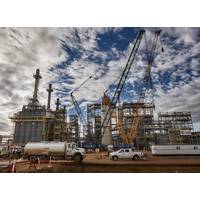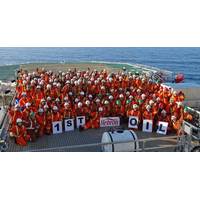Canadian Energy Sector to Boost Spending

Capital spending by Canada's oil and gas industry will rise by 6%, or C$1.9 billion, in 2020 from the previous year, halting a six-year decline due to improving economics, the Canadian Association of Petroleum Producers (CAPP) forecast on Thursday.CAPP said a corporate tax cut by Alberta's provincial government last year and its easing of oil production limits will lead to higher spending.Congested pipelines created a glut of oil in storage in the Western Canadian province in recent years, depressing prices and causing its government to…
Why Canada is the Next Frontier for Shale Oil

The revolution in U.S. shale oil has battered Canada's energy industry in recent years, ending two decades of rapid expansion and job creation in the nation's vast oil sands. Now Canada is looking to its own shale fields to repair the economic damage. Canadian producers and global oil majors are increasingly exploring the Duvernay and Montney formations, which they say could rival the most prolific U.S. shale fields. Canada is the first country outside the United States to see large-scale development of shale resources, which already account for 8 percent of total Canadian oil output.
ExxonMobil's Canada Offshore Project Produces First Oil

The Hebron oil project off the coast of eastern Canada has produced its first oil, operator Exxon Mobil said on Tuesday, in a boost to Atlantic Canada's output after years of weak crude prices. At its peak Hebron will produce up to 150,000 barrels per day (bpd), Exxon said. It will help Atlantic Canada offshore production climb 44 percent to 307,000 bpd by 2024, according to estimates from the Canadian Association of Petroleum Producers. The platform is located 200 miles (350 kilometres) off the coast of Newfoundland and Labrador in depths of 300 feet (92 metres) and the oil field…
KeystoneXL Opponents Vow Long Fight as Nebraska Hearing Concludes
Opponents of the Keystone XL pipeline vowed on Thursday to block construction of the controversial project if Nebraska regulators approve the proposed route later this year. Nebraska regulators wrapped up a final public hearing a day early on Thursday on TransCanada Corp's proposed Keystone XL pipeline after four days of contentious exchanges between lawyers. They will make their final decision by Nov. 23. After the hearing, two dozen landowners and other pipeline opponents vowed non-violent civil disobedience if the commission rules in favor of TransCanada.
Canceled LNG Project Casts Shadow over Canada's Biggest Shale Play
Petronas' decision to cancel its Pacific NorthWest LNG project is a blow to the growth outlook for Canada's largest shale play, eliminating a potentially huge source of future gas demand. Gas from the Montney shale play in western Canada would have supplied the C$36 billion ($28.7 billion) project in northern British Columbia. The project, majority-owned by Malaysia's Petronas, would then have shipped 12 megatonnes per year of liquefied natural gas to Asia. Instead, state-owned Petroliam Nasional Bhd (Petronas) subsidiary Progress Energy…
Innovators Toil to Revive Canada Oil Sands
In the boreal forests and on the remote prairies of Alberta, a handful of firms are running pilot projects they hope will end a two-decade drought in innovation and stem the exodus of top global energy firms from Canada's oil sands. They are searching for a breakthrough that will cut the cost of pumping the tar-like oil from the country's vast underground bitumen reservoirs and better compete with the booming shale industry in the United States. If they fail, a bigger chunk of the world's third-largest oil reserves will stay in the ground.
Canada Mulls Single Body to Assess Pipelines
Canada needs a single federal authority to assess the potential impact of major projects such oil pipelines and mines, a move that could help quell environmental protests, an official panel said on Wednesday. Responsibility for examining the potential impact of projects on federally-regulated land in Canada is shared between three separate entities, a much-criticised system that the Liberal government says the public does not trust. Protracted protests last year forced Ottawa to veto one major pipeline from Alberta's oil sands to the Pacific Coast and are dragging out study of another line to the Atlantic.
New Pipelines No Silver Bullet for Battered Canada Oil Industry
Canada's oil sands producers are getting a long-awaited boost in export capacity, but the two pipeline projects approved this week will not be a silver bullet for the industry's woes unless crude prices pick up or companies improve their operating efficiency. The Canadian government approved Kinder Morgan's plan to triple volumes on its Trans Mountain pipeline to 890,000 barrels per day, and cleared Enbridge Inc's Line 3 replacement project, which will roughly double capacity to 760,000 bpd. Enbridge's Northern Gateway pipeline was rejected.
Low Prices May Hobble Potentially Massive New Canada Oilfield
A deepwater oilfield off the coast of eastern Canada could hold 25.5 billion barrels of crude, according to a new seismic report by the Newfoundland and Labrador government, potentially making it the country's largest offshore resource. But the West Orphan Basin, 300 km (186 miles) northeast of Newfoundland, may still struggle to attract exploration bids in a November land sale due to persistently low crude prices. Paul Barnes, Atlantic Canada and Arctic manager with the Canadian Association of Petroleum Producers, said while publicly available seismic data was useful…
Oil Ends Higher in Choppy Trade ahead of Britain's EU Vote
Oil prices closed 2 percent higher after a volatile session on Thursday, with investors less worried about prospects for the global economy after the last pre-vote opinion polls showed Britain was likely to remain in the European Union. Oil prices were also supported by market intelligence firm Genscape's report of a drawdown of nearly 1 million barrels at the Cushing, Oklahoma storage base for U.S. crude futures during the week to June 21, traders who saw the data said. Brent crude settled up $1.03, or 2.1 percent, at $50.91 a barrel. U.S. crude settled at $50.11 a barrel, up 98 cents. Both contracts shot up in the last few minutes of trading.
Canada's Oil Output to grow 28 pct by 2030
Canadian oil production will grow by 28 percent to hit 4.9 million barrels per day (bpd) by 2030, the Canadian Association of Petroleum Producers said in its annual report. The estimate is lower than CAPP's previous forecast of 5.3 million bpd by 2030, and comes amid a two-year rout in global oil prices that continue to hammer Canadian oil companies, which have slashed billions in capital expenditures. Production from Alberta's oil sands, the world's third-largest crude reserves and No. 1 source of U.S. oil imports, will hit 3.7 million bpd by 2030, the industry group said on Thursday.
Cenovus Cuts Nearly 250 Workers
Cenovus Energy said it let go nearly 250 employees on Tuesday as part of a previously announced restructuring, a spokesman said, adding to the tens of thousands of energy industry workers laid off in Canada since oil prices crashed. The cuts at the oil and gas producer are part of the 440 layoffs outlined by Cenovus earlier this year, when it reported quarterly losses and said it would slash its dividend and 2016 capital budget. Spokesman Brett Harris said 190 contractors lost their jobs earlier this year and with Tuesday's cuts the bulk of the planned layoffs were now complete.
Hefty Maintenance Schedule Looms for Canada Oil Sands Producers
The move is seen temporarily curbing supply in the second and third quarters, which should lift crude prices in the region and give producers a respite from selling their barrels below cash costs. Among producers planning major work at their facilities, Suncor is planning the first five-yearly turnaround on its U2 upgrader, Cenovus has three turnarounds planned versus none last year and Canadian Natural has scheduled 30-35 days of maintenance deferred from 2015. Not all producers disclose the impact on output, making year-on-year comparisons difficult…
Alberta Panel to Review Climate-change Policy
The Canadian province of Alberta, the biggest source of U.S. oil imports, announced the members of its climate change policy review panel on Friday, part of its pledge to implement new rules on greenhouse gas reductions. Environment Minister Shannon Phillips said the panel would offer recommendations to the government by early November, ahead of a key United Nations climate change conference in Paris in December, but did not say when new GHG targets are likely to come into effect. The five members of the panel are University of Alberta energy economist Andrew Leach…
Alberta Mulls Splitting Energy Regulator from Promoter Role
The Canadian province of Alberta, the largest source of U.S. oil imports, is considering splitting its energy regulator to avoid a potential conflict with its role as promoter of the oil and gas industry, a spokeswoman for the premier said on Tuesday. Notley's left-wing New Democratic Party, which last month ended 44 years of Conservative rule with a majority election victory, may pull apart the Alberta Energy Regulator (AER) to separate its twin mandate to police energy developments while promoting the industry. Notley, a long-standing critic of the regulator…
Alberta Energy Minister Inexperience Concerns Industry
Canada's oil and gas industry is concerned about the inexperience of Alberta's new energy minister, but is ready to give her the benefit of the doubt for now as she takes on the closely watched role, analysts and executives said on Monday. Marg McCauig-Boyd, a one-time teacher with a master's degree in administration and leadership from San Diego State University, was on Sunday appointed as energy minister by new Premier Rachel Notley. Notley's left-wing New Democratic Party toppled a 44-year-old conservative government in a May 5 vote, but only a few of its lawmakers have ever held public office.
Alberta's Possible Pivot to Left Alarms Oil Sector
CALGARY, Alberta, May 4 (Reuters) - Canada's oil-rich province of Alberta is on the cusp of electing a left-wing government that can make life harder for the energy industry with its plans to raise taxes, end support for key pipeline projects and seek a bigger cut of oil revenues. Polls suggest Tuesday's election is set to end the Conservative's 44-year reign in the province that boasts the world's third-largest proven oil reserves and now faces recession because of the slide in crude prices. Surveys have proven wrong in Canadian provincial elections before and voters may end up merely downgrading the Conservatives' grip on power to a minority government.
Canadian Crude-by-rail Export Volumes Dip
Strong Canadian crude prices and loading terminal maintenance have slowed down the oil sands' crude-by-rail boom, industry players said on Monday, after government data showed crude exports by rail dipped in the second quarter of 2014. Figures from the National Energy Board released late on Friday showed Canadian crude exports by rail fell 1.3 percent to 163,063 barrels per day in the second quarter of this year, compared with 165,254 bpd in the first quarter. Exports in the three months to June were still up 22 percent on the same period a year earlier, but the dip belies industry predictions of breakneck growth.
Canada's Light Oil Boom Delights Producers
Canada is enjoying an unexpected boom in production of ultra-light crude known as condensate, defying long-held predictions of dwindling supply. This surprising bounty from one corner of Alberta, better known as the home to Canada's vast tar-like oil sands reserves, is a boon for firms like Vermilion Energy Inc and Chevron who have built up positions in the Duvernay, now hotly tipped as one of North America's most exciting shale plays with vast reserves waiting to be tapped. It also is fuelling hope of cost relief for traditional heavy oil sands companies such as Cenovus Energy Inc…
Honeywell to Automate Canadian Oil Sands Project
Honeywell Process Solutions says it was selected by Suncor Energy to provide automation systems for a new multi-billion dollar Fort Hills Oil Sands project in Alberta, Canada. Honeywell will supply technology to integrate the site’s control and safety systems, manage alarms, and provide advanced simulation software that enables critical operations planning and operator training. As the Main Automation Contractor (MAC), Honeywell will play a key role in helping the facility achieve its future productivity and operational efficiency goals. The facility is expected to be operational in late 2017.
